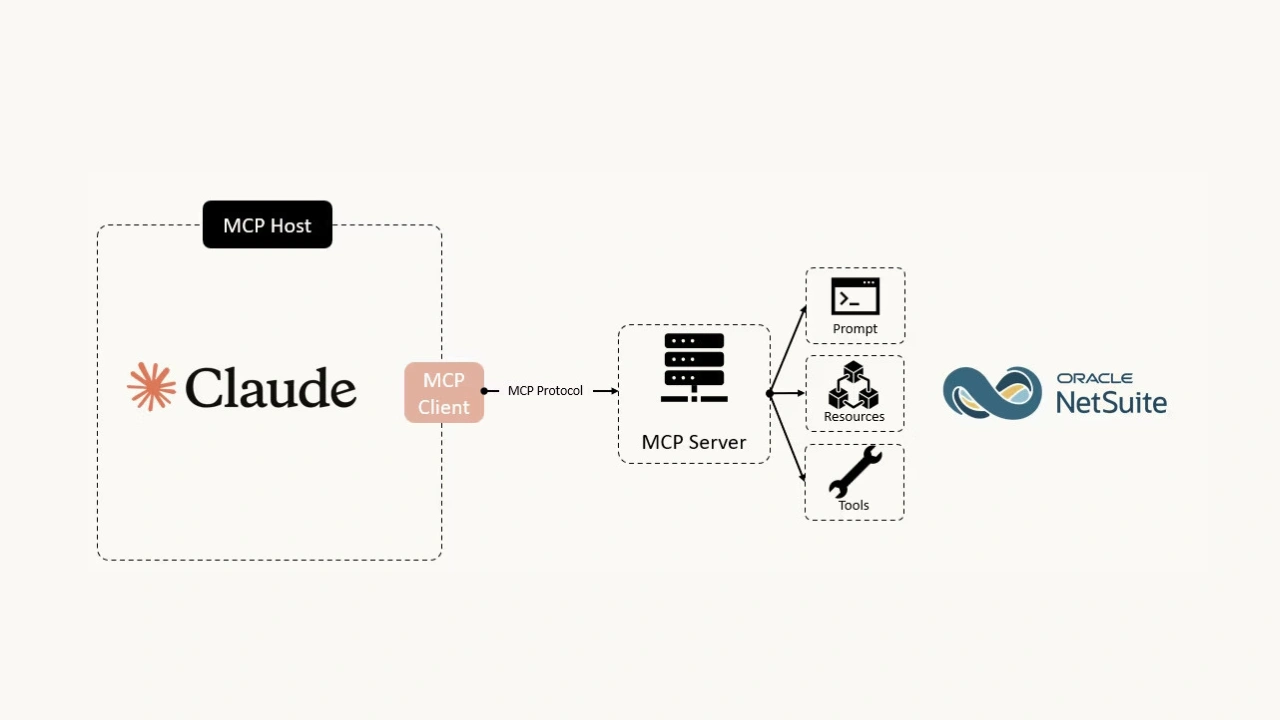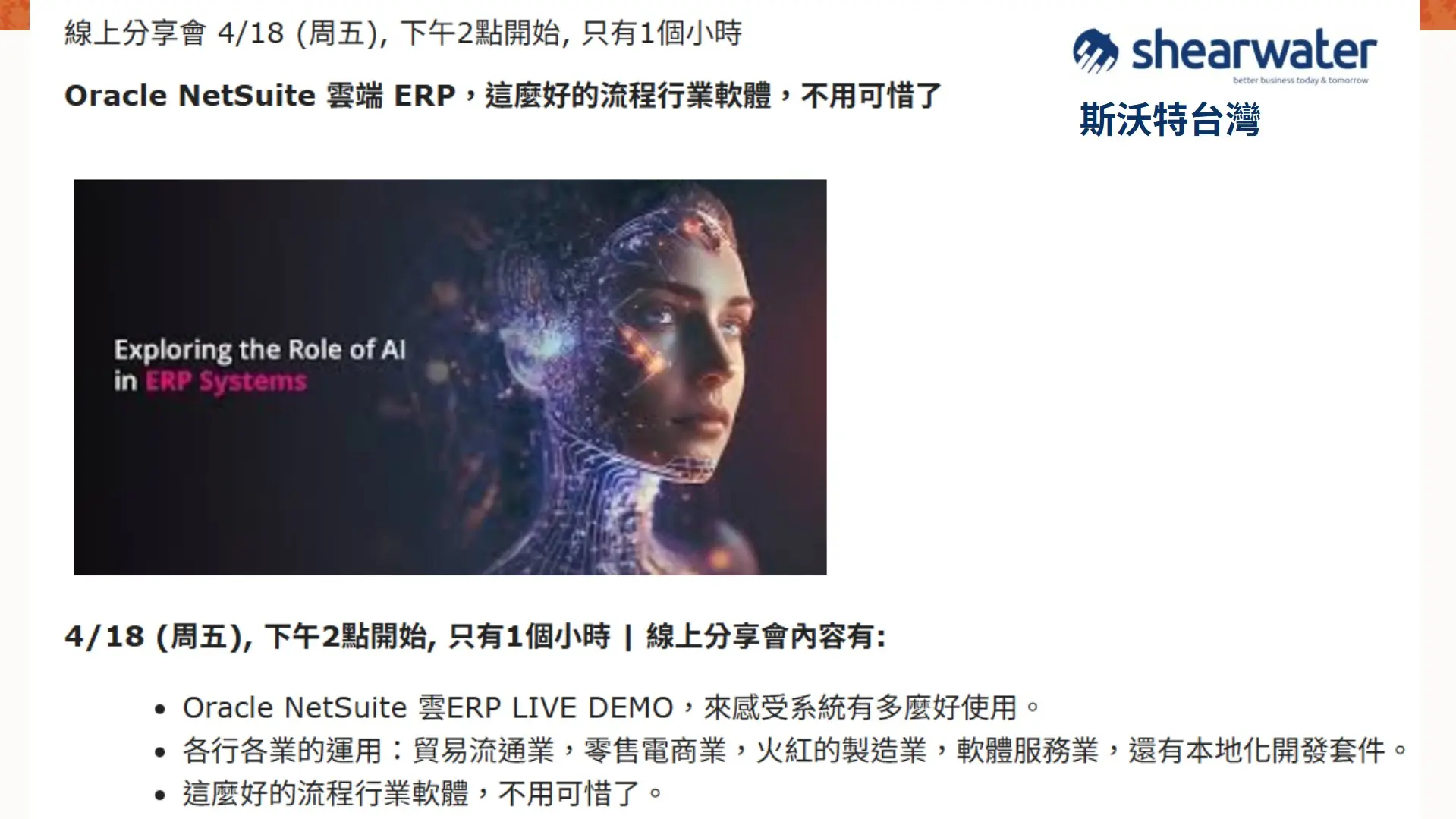
斯沃特台灣 | 財務數位轉型諮詢
斯沃特台灣是亞洲領先的一站式財務數位化轉型諮詢公司,在實施財務自動化項目和其他幫助企業實現工作流程自動化的雲端解決方案方面擁有超過 14 年的經驗。我們是 2023 年度解決方案提供商獎 – Workday 新星合作夥伴,與該地區最大的雲端顧問團隊之一合作。 Shearwater 台灣提供一套雲端解決方案,包括雲端企業資源規劃 (ERP)、企業績效管理 (EPM)、賬戶對賬和財務結算流程自動化、公司間財務整合、整合和工作流程自動化平台。




2021年9月7日,杭州恒信进出口有限公司 Oracle NetSuite ERP项目启动会在杭州隆重举行。届时,恒信方费总,Oracle原厂代表董老师、任经理、米经理以及 Shearwater项目组三方成员共同参加了此次会议。
【公司背景】
杭州恒信进出口有限公司成立于2004年,是一家集室内家居鞋设计、研发、生产、批发和零售于一体的大型公司。目前,杭州恒信进出口有限公司已经通过ISO9001国际质量认证体系认证,并被评为工商信用A类企业、海关A类企业。公司于2008年成立内销子公司:杭州顶尚日用品有限公司。公司总部位于素有人间天堂美誉的杭州市,集设计研发、产品陈列和销售于一体,同时在浙江省衢州市设有生产基地——衢州恒信鞋业有限公司。

【项目介绍】
恒信领导层经多方了解得知,甲骨文公司作为世界一流的云SAAS ERP软件供应商,具有良好的品牌形象及行业知名度,值得信赖;拥有从财务到业务再到服务的业财一体化解决方案,全方位的功能覆盖;灵活的二次开发定制平台,具有良好的功能扩展性;从IAAS到PAAS,再到SAAS的全方位一体化解决方案。帮助企业妥善管理多国家和多分支机构;以及线上网店线下门店整合运营,并且能帮助企业有效改善运营效率。所以选择了Oracle NetSuite,并携手Oracle NetSuite五星级代理商Shearwater进行基本模块配置与开发。在此次项目中涉及到了跨境电商、国内电商以及生产制造方面,Shearwater在多年的客户咨询和服务过程中,积累了诸多成功经验,也总结出一整套的相关行业解决方案。
Shearwater作为Oracle NetSuite亚洲区五星级合作伙伴,具有丰富的实施经验,拥有多国家、多语言的项目组成员,能够为中国客户出海提供本地化的技术支持,并且在2021年度斯沃特取得亚太地区客户服务最佳合作伙伴&亚太地区明星合作伙伴以下两大奖项。

在此次会议上,Shearwater对恒信 Oracle NetSuite项目提供了相应的解决方案,以期实现恒信公司的业财一体化和集团化管控。作为本次项目的实施方代表,Shearwater项目经理对于项目的建设目标,项目实施方法、项目计划、项目管理制度以及项目文档做了详细的汇报,并且与恒信项目组成员针对项目内容和解决方案以及双方所负责的范围达成共识。

预祝杭州恒信进出口有限公司Oracle NetSuite项目早日上线,非常感谢杭州恒信对斯沃特的信任与支持,相信在双方的合作下,此次Oracle NetSuite项目定能取得成功!


2024年1月3日,新皕家居&斯沃特Oracle NetSuite ERP项目启动会在宁波隆重举行。新皕家居团队李总,柴主管,黄经理以及项目组成员、斯沃特|Shearwater大中华区CEO陈先生以及项目团队成员共同参加了此次会议。
宁波新皕家居有限公司成立于2018年,是国内跨境电商行业中的翘楚。在Amazon Homedepot Walmart Wayfair等平台取得优异业绩,2021年业务规模超8000万美金,个别品类市场占有率达到前五名,在美国拥有约4万平方米的海外仓。
Oracle NetSuite在技术类 IPO 市场占主导地位,全球拥有36000+客户,在中国跨境电商行业拥有行业标杆客户超过300+。在中国,服务中国!Oracle NetSuite-从初创公司到大型企业,一直提供领先的云 ERP 业务软件解决方案。
也正因为如此,作为国内跨境电商头部企业,新皕家居基于不断壮大的业务需求,前期经过大量市场调研与产品预期价值对比,最终选择Oracle NetSuite产品并且与斯沃特|Shearwater实施团队合作,这是对Oracle NetSuite解决方案的认可也是斯沃特|Shearwater在业内实施开发能力与口碑价值的最好印证。

本次项目启动前期,斯沃特|Shearwater团队就凭借多年跨境电商行业的精进经验给予了与客户目前痛点与未来发展需求相匹配的解决方案和建议,获得了新皕家居团队的一致好评。斯沃特|Shearwater在跨境电商行业积累了大量的行业经验,拥有现成的专业解决方案,可以实现快速实施部署,可实现跨境电商企业多国家多税制,业务板块的业财一体,降低财务人员工作量,提高月结效率,降低风险。
本次项目,斯沃特团队旨借助Oracle NetSuite,通过信息化建设对新皕家居现有业务流程进行优化,通过易仓实现前端电商平台和NetSuite线上对接、业财一体化、集团财务合并报表等,为后续公司提供综合经营分析夯实基础,为客户实现预期价值:业财一体化
电商平台与NetSuite线上无缝对接,实现业务与财务一体化管理;核心业务如销售、采购、库存等都可在财务中及时、真实的体现。
优化现有流程,化繁为简
优化现有销售,采购,头程,物流,库存管理的流程,精准追溯产品来源和去向,线上作业,减少人员重复的操作。
降本增效
提升成本精细化管理水平,打造标准成本体系,及时发现成本波动和成本浪费,有效应对,不断优化成本结构。
集中式统一管理
优化并统一规范集团业务流程,有效提升业务标准化管控能力,将业务标准固化到信息系统。
便捷高效的系统工作
减少信息重复录入及报表等手工工作,大幅提高工作效率。同时通过简化用户操作,进一步提高用户体验。
实时的数据流转控制
实现公司内部信息流线上实时共享和互通,减少部门间沟通成本,实现跨业务、跨部门的信息共享和高效利用。
在未来的项目合作中,斯沃特将借助NetSuite的产品优势,自身的技术研发及实施能力,结合客户业务需求进行科学部署与运维工作,将和新皕家居无间配合,为项目的顺利上线做好技术保证和支持;NetSuite将为客户的科学决策做好辅助支持,助力客户加强集团管控。

斯沃特|Shearwater Oracle NetSuite 引领跨境电商行业ERP价值交付
4月29日Kitchen Mama & 斯沃特|Shearwater Oracle NetSuite ERP项目在中国台湾正式启动,
这是斯沃特|Shearwater NetSuite 团队在跨境电商行业深耕的又一里程碑式的地位说明,
同时也是Kitchen Mama 在数字化发展路上的一个新的篇章。

斯沃特大中华区CEO陈胜喜先生、斯沃特方案总监Jamie Yang、斯沃特台湾团队、Kitchen Mama团队、共同参与本次会议
关于Kitchen Mama
Kitchen Mama来自中国台湾,是一间国际化的厨房用品新创公司,始终相信烹饪是关于幸福的满足和爱的分享。应该要轻松而且自由自在,毫不费力。
Kitchen Mama 开发创新的厨房产品来帮助人们“轻松分享爱”和“享受烹饪”,并致力于带给全世界源源不绝地全新的厨房体验!

斯沃特|Shearwater&Kitchen Mama以NetSuite为基石的数字化战略发展
随着跨境电商的日趋成熟发展,Kitchen Mama的高品质产品,也推向更广阔的国际市场,实现更高的销售额和利润。
同所有的跨境电商行业一样,Kitchen Mama也面临着新的数字化发展挑战。
为了确保本次项目的顺利实施上线,为客户交付满意的商业价值,斯沃特|Shearwater 充分调动斯沃特华南团队、斯沃特台湾团队的中坚力量通力合作。
斯沃特|Shearwater 团队成员拥有丰富的ERP实施经验和技术专长,深入的跨境电商行业了解和经验,拥有有效的项目管理流程和经验,能够确保项目按时交付、预算合理、质量可控。
斯沃特|Shearwater在跨境电商行业积累了大量的行业经验,拥有现成的专业解决方案,可以实现快速实施部署,可实现跨境电商企业多国家多税制,业务板块的业财一体,
降低财务人员工作量,提高供应链协同效率,降低库存不及时不准确所带来的风险。

本次项目斯沃特|Shearwater将以NetSuite为基石为Kitchen Mama发展搭建科学的数字化管理机制,对Kitchen Mama现有业务流程进行优化,
实现电商平台或其他第三方仓储物流和Netsuite线上对接、业财一体化、集团财务合并报表等,为后续公司提供综合经营分析夯实基础。